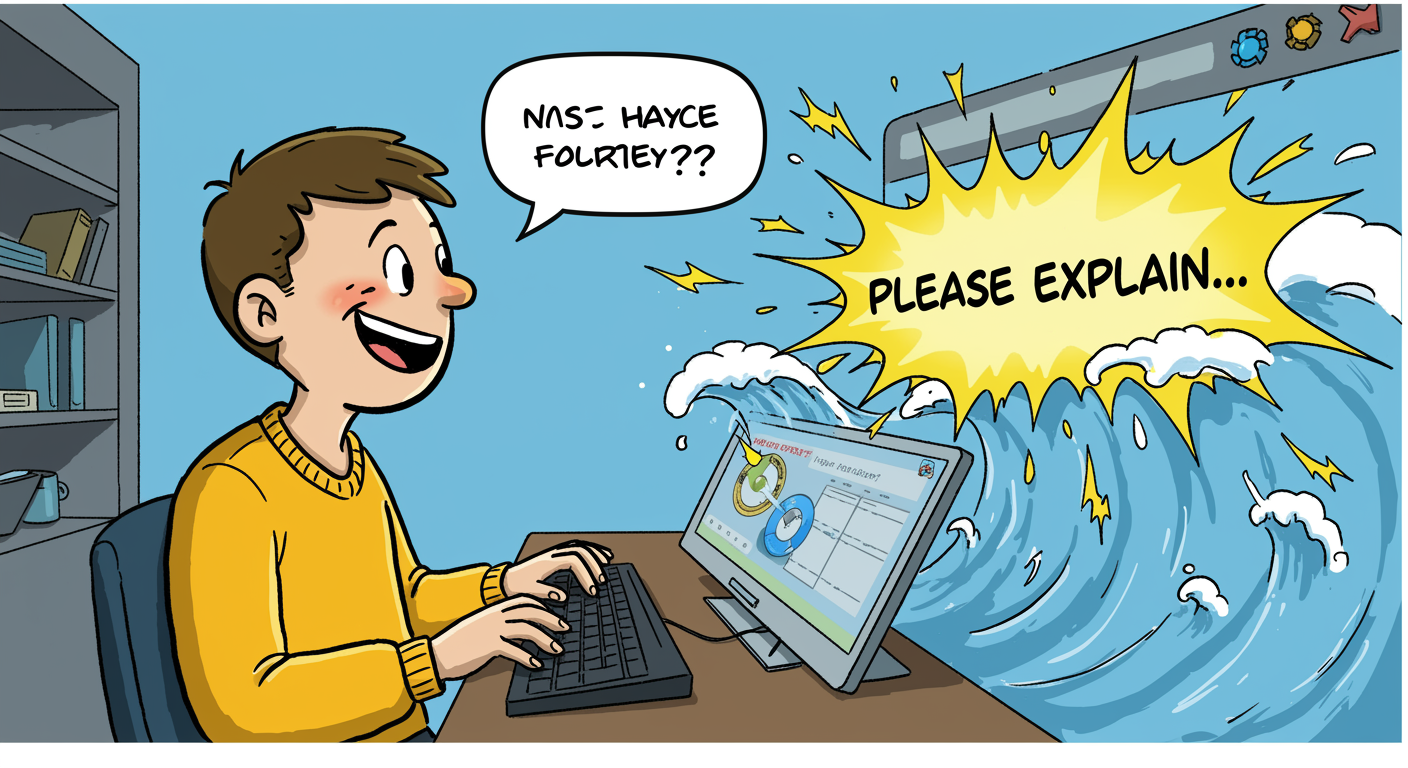
ChatGPT Politeness Costs Millions, OpenAI CEO Reveals
The High Price of AI Energy Costs in Saying “Please” and “Thank You” to AI
Every digital conversation carries a hidden expense, and AI energy costs are proving to be a surprising culprit. According to OpenAI CEO Sam Altman, the simple act of users adding “please” and “thank you” to their ChatGPT prompts is racking up tens of millions of dollars annually in energy and computational demands. As AI becomes a staple in everyday life, these polite exchanges aren’t just courteous—they’re amplifying AI energy costs, both for OpenAI’s bottom line and the planet’s resources.1 Have you ever wondered if your good manners online could be contributing to a larger environmental footprint?
This revelation highlights how even minor adjustments in user behavior can escalate AI energy costs. For instance, each extra word in a prompt requires more processing power from massive data centers, turning what seems like a harmless habit into a significant financial burden. It’s a reminder that in the world of AI, efficiency and etiquette don’t always align.
How Manners Amplify AI Energy Costs
Politeness might make interactions feel warmer, but it’s directly inflating AI energy costs for companies like OpenAI. Every additional phrase in a ChatGPT query demands more electricity and computational resources, leading to a noticeable spike in operating expenses. With ChatGPT’s large language model relying on energy-intensive GPUs, these costs add up quickly across billions of daily interactions.2
- OpenAI handles billions of prompts from over 500 million weekly users, each one potentially increasing AI energy costs through extended processing.3
- A single ChatGPT query uses about 10 times the energy of a standard Google search, roughly 0.14 kWh per interaction—enough to power 14 LED lightbulbs for an hour.5
- This means that widespread politeness isn’t just a social norm; it’s a factor in rising AI energy costs that could strain global energy grids as AI adoption grows.
Imagine typing a quick “Hey ChatGPT, could you please explain quantum physics?” versus a blunt “Explain quantum physics.” The polite version might feel more natural, but it extends the query length, bumping up those AI energy costs. In a hypothetical scenario, if every user adopted this habit, it could equate to the annual energy use of a small town—food for thought as we navigate AI’s expanding role.
Social Trends: Why Do People Treat AI Politely?
A 2024 survey revealed that 67% of Americans use courteous language with AI chatbots, often driven by a sense that it’s the right thing to do. This trend ties into broader AI energy costs, as these extras words multiply across millions of users. For many, saying “please” stems from moral instincts, while others joke about it as a way to stay on AI’s good side amid rising concerns about technology’s future.2
- About 55% of respondents said politeness feels morally appropriate, reflecting how we’re extending human values to machines.
- Another 12% admitted it’s a hedge against potential AI risks, like those seen in sci-fi stories.
- Some users even craft elaborate greetings, turning interactions into a blend of humor and habit, which only heightens AI energy costs indirectly.
Public Reactions: Humor, Anxiety, and the Debate on AI Energy Costs
Social media lit up with reactions to Altman’s comments, mixing laughs with deeper reflections on AI energy costs. People shared memes about over-polite prompts, with one viral post quipping, “If I say ‘pretty please,’ does that double the AI energy costs?” Yet, others pointed out that teaching AI respect mirrors how we raise kids—instilling empathy in our digital habits.4
“We teach children to say ‘thank you’ and ‘please,’ not because it’s efficient, but because it instills empathy, respect, and emotional awareness. As AI becomes part of everyday interaction, how we prompt it reflects our values.”4
This pushback raises a key question: Is the rise in AI energy costs a price worth paying for more humane technology? For example, if you’re chatting with ChatGPT about daily advice, adding a polite touch might make the experience feel more personal, but at what environmental cost?
Environmental and Financial Impact of AI Energy Costs
The toll of AI energy costs extends far beyond OpenAI’s finances, affecting global sustainability efforts. As users flood systems with polite prompts, the demand for electricity in data centers surges, contributing to higher carbon emissions and resource strain. These seemingly small habits, when scaled up, underscore the real-world implications of our digital behaviors.5
| Interaction Type | Estimated Energy Use | Business Impact |
|---|---|---|
| Standard Google Search | ~0.014 kWh | Minimal, highly optimized |
| ChatGPT Query | ~0.14 kWh | Significantly higher, driving up AI energy costs |
Strategies to Reduce AI Energy Costs
Experts suggest ways to tackle escalating AI energy costs, like optimizing prompts or shifting some processing to user devices. For instance, you could try shortening your requests while keeping them civil—think “Summarize this article” instead of “Could you please summarize this article for me?” This simple tweak might help lower overall AI energy costs without sacrificing politeness entirely.2
OpenAI is exploring these options, but balancing user experience with efficiency remains a challenge. As an everyday user, adopting mindful prompting could be an actionable step toward sustainability.
OpenAI’s Perspective: Investing in AI Energy Costs for Better Experiences
Despite the hefty AI energy costs, Sam Altman views them as a worthwhile investment in creating intuitive AI. OpenAI’s focus on human-like interactions means they’re prioritizing engagement over pure efficiency, even if it means higher expenses in the short term.1 With recent funding rounds pushing their valuation to $300 billion, the company can afford this approach for now.3
- In 2025, OpenAI secured $40 billion in new capital, giving them the resources to manage rising AI energy costs.
- However, the long-term question is how to sustain this without compromising environmental goals.
- Altman argues that fostering relatable AI is key, but it prompts us to consider: Can we innovate ways to cut AI energy costs while keeping things personable?
The Broader Implications: Future Trends in AI Energy Costs
As AI weaves into our routines, the effects of behaviors like digital politeness will only grow, especially regarding AI energy costs. This isn’t just about OpenAI—it’s a call for the industry to rethink how we balance innovation with planetary limits. Will we continue prioritizing seamless interactions, or adapt to more efficient models?
Key Takeaways on Managing AI Energy Costs
- Polite AI interactions drive up AI energy costs, creating real financial and environmental challenges for developers.4
- Our approach to AI reflects societal values, urging a balance between courtesy and sustainability.
- Moving forward, advancements in tech could help mitigate AI energy costs, but it starts with user awareness and smarter habits.
Conclusion: Is Politeness Worth the AI Energy Costs?
Politeness in AI chats has become second nature, but as we’ve seen, it’s tied to substantial AI energy costs that affect everything from OpenAI’s operations to global energy use. Sam Altman believes it’s a smart investment for now, yet this debate invites us to reflect on our digital footprint. What do you think—should we adjust our habits for the sake of efficiency, or hold onto those manners that make tech feel more human?
We’d love to hear your thoughts in the comments below. Share this post if it sparked any ideas, and explore more on AI sustainability in our related articles.
References
- TechCrunch: Your politeness could be costly for OpenAI
- Economic Times: Sam Altman reveals cost of politeness to ChatGPT
- Entrepreneur: Saying “Thank You” to ChatGPT Costs Millions in Electricity
- VICE: Telling ChatGPT ‘Please’ and ‘Thank You’ Costs OpenAI Millions
- FOX 13 Seattle: ChatGPT polite prompts cost energy
AI energy costs, ChatGPT, OpenAI, polite prompts, Sam Altman, AI politeness costs, digital manners, AI environmental impact, ChatGPT energy use, AI sustainability





